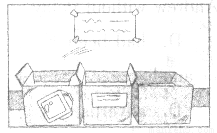题目内容
The day of my holiday arrived, but I wasn’t looking forward to it. I had little money and had only been able to afford to stay with my Aunt Rosa in Spain. So, I wasn’t really excited as I knew exactly what it was going to be like; Lots of noisy cousins and Aunt Rosa begged me to take her for a ride.
After I had checked in, I made my way slowly to the departure gate. As I was waiting to board the plan, I kept thinking about my ideal holiday destination; Jamaica, with its long, sandy beaches and crystal clear water.
As soon as the plane took off, I fell fast asleep and only woke to the sound of the announcement; “Ladies and gentlemen, please fasten your seat belts, as we will shortly be landing in Kingston.” I froze in my seat. Was I dreaming? Kingston? Jamaica? I had boarded the wrong plane!
Immediately after the plane landed, I explained the situation to the authorities. It seems there were also three of other passengers heading for Spain. Apparently it had been the airline’s fault, since the flight numbers for Spain and Jamaica were exactly the same! Therefore, with no flight to London for a week, the airline had no choice except to pay for our stay.
So there I was, lying on the beach, enjoying the music and marvelous food of Jamaica! As for Aunt Rosa, I suppose she just had to live without me!
1.Why did the waiter choose to spend her holiday with her aunt in Spain?
A. She could hardly afford any better trip.
B. Her aunt begged her to go there.
C. She missed her cousins very much.
D. Spain was her ideal destination.
2.In the story, the writer ended up _____.
A. heading for Spain from Jamaica
B. flying to London immediately
C. enjoying a free beach holiday
D. complaining to the authorities
3.Which of the following might be the best title of the passage?
A. Terrible Adventure B. Nice Dream
C. A Well-Planned D. Lucky Mistake



